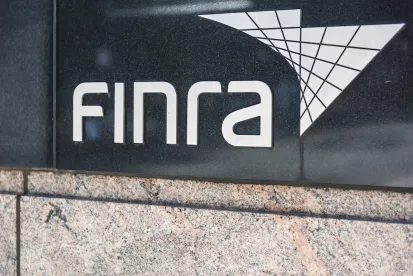The Securities and Exchange Commission (SEC) recently adopted amendments to SEC Rule 15b9-1 that will require virtually every broker-dealer to become a Financial Industry Regulatory Authority (FINRA) member.1 With these amendments, the SEC eliminated a long-standing proprietary trading exclusion that had allowed certain proprietary trading firms, options market makers and other broker-dealers (a total of approximately 64 firms, according to the SEC's adopting release) to operate as broker-dealers without incurring the potential costs and burdens of FINRA membership.2 As a result, these firms will be required to become FINRA members within 365 days after the publication of the amended rules in the Federal Register.
Prior to the recent rule changes, a broker-dealer could bypass FINRA membership in reliance on Rule 15b9-1 if it:
-
was a member of an exchange;
-
carried no customer accounts; and
-
had annual gross income derived from securities transactions otherwise than on a national securities exchange of which it was a member in an amount no greater than $1,000. However, income derived from transactions for the broker-dealer's own account with or through another registered broker-dealer did not count towards the $1,000 limitation.
The SEC has replaced the third prong above (i.e., the proprietary trading exclusion) with two narrow exceptions that apply to off-member-exchange securities transactions that either:
-
result solely from orders that are routed by a national securities exchange to comply with order protection regulatory requirements (e., Rule 611 of Regulation NMS and the Options Order Protection and Locked/Crossed Market Plan); or
-
are solely for purposes of executing the stock leg of a stock-option order.3
These amendments drastically limit the scope of the exemption previously provided by Rule 15b9-1 and effectively render the exemption unavailable for the vast majority of proprietary broker-dealer firms, as the FINRA membership requirement would apply regardless of whether the proprietary trading broker-dealer trades exclusively with other SEC-registered broker-dealers on alternative trading systems (ATSs) or other markets (including exchanges of which it is not a member), or some combination of the two. According to the SEC, requiring previously exempt proprietary trading firms to become FINRA members will provide a more consistent regulatory framework for all broker-dealers.
Consequently, a proprietary trading firm likely could avoid FINRA membership only if: (1) it is not registered with the SEC as a broker-dealer; or (2) it effects transactions in securities only on national securities exchanges of which it is a member.
With respect to the first option, a proprietary trading firm that wishes to operate without registering as a dealer must perform a thorough analysis of relevant laws and SEC guidance. For example, under the Securities Exchange Act of 1934, a dealer is "any person engaged in the business of buying and selling securities . . . for such person's own account through a broker or otherwise" and, with limited exceptions, is required to register with the SEC as such.4
For many proprietary trading firms, the second option described above (i.e., not conducting any activity in securities other than on national securities exchanges of which it is a member) may not be a feasible business model.
The FINRA Application Process
The FINRA membership application process can be a time-consuming endeavor that may take up to six months or longer and often requires substantial interaction with FINRA staff before approval is granted. FINRA staff also typically conducts a pre-membership interview of applicants. However, in a comment letter to the SEC, FINRA indicated that it tentatively believes that firms that are already members of an exchange and are engaged solely in proprietary trading activity would qualify for FINRA membership group's fast track/triage program (FTT Program), which would shorten the application processing time to around 60 days. According to the comment letter, FINRA staff has identified ways to expedite the processing of these applications even further.
In general, a FINRA membership application requires completion and submission of, at a minimum:
-
Form BD;
-
the FINRA New Membership Application (Form NMA);
-
Forms U4/fingerprint cards for all registered personnel;
-
a detailed business plan describing proposed activities, personnel and product mix;
-
pro forma financials; and
-
written supervisory procedures (including, but not limited to, anti-money laundering and know-your-customer procedures, continuing education program, business continuity plan and detailed supervisory policies).
A full summary of the FINRA membership application process and the documents required is available upon request.
What FINRA Membership Means for Proprietary Trading Firms
FINRA membership will impose certain additional obligations on proprietary trading firms. Notably, as FINRA members, proprietary trading firms will be required to report their trades in US Treasury securities to FINRA's fixed-income reporting system, Trade Reporting and Compliance Engine (TRACE).5
Although FINRA generally assesses a Trading Activity Fee (TAF) on member firms for all equity sales transactions that are not performed in their capacity as a registered exchange specialist or market maker, FINRA recently amended its bylaws to provide that it will not apply a TAF to transactions by a proprietary trading firm executed on an exchange on which the proprietary trading firm is a member.6 The amendment will become effective 60 days after the SEC's amendments to SEC Rule 15b9-1 have been published in the Federal Register.
Additionally, proprietary trading firms will become subject to FINRA's examination and enforcement jurisdiction. Although FINRA can currently monitor transactions of non-member market participants through the Consolidated Audit Trail and coordinate regulatory oversight with the various exchanges (i.e., self-regulatory organizations), according to the SEC, FINRA membership will enable it to "apply its expertise in supervising these [proprietary trading] firms' off-member-exchange securities trading activity and investigating potential misconduct with the same degree of autonomy that it can for [current] FINRA members."7
Conclusion
The SEC's recent changes to Rule 15b9-1 have significant implications for proprietary trading firms registered with the SEC that are currently exempt from FINRA membership. Accordingly, any such firms that are required to become FINRA members when the amendments to Rule 15b9-1 become effective, must carefully prepare for the FINRA membership application process and ongoing compliance with applicable FINRA rules.
1 SEC, "Fact Sheet: Exemption from National Securities Association Membership", available here (last visited September 1, 2023).
2 See Katten's article on this topic, available here.
3 The amendments are identical to the amendments proposed by the SEC on July 29, 2022. A more fulsome summary of the amendments as proposed and the SEC's rationale for the amendments is available here.
4 See 15 U.S.C. § 78c(a)(5). Note that the SEC proposed new rules last year that, if adopted, would significantly expand the definition of a "dealer" and require such person to register with the SEC and become FINRA members. See Katten's advisory on this topic, available here.
5 See generally FINRA Rule 6700 Series.
6 Self-Regulatory Organizations; Financial Industry Regulatory Authority, Inc.; Notice of Filing and Immediate Effectiveness of a Proposed Rule Change to Amend FINRA's Trading Activity Fee, 88 Fed. Reg. 42404 (June 30, 2023).
7 Exemption for Certain Exchange Members, SEC Release No. 34-98202, (Aug. 23, 2022), at 72, available here.





 />i
/>i
